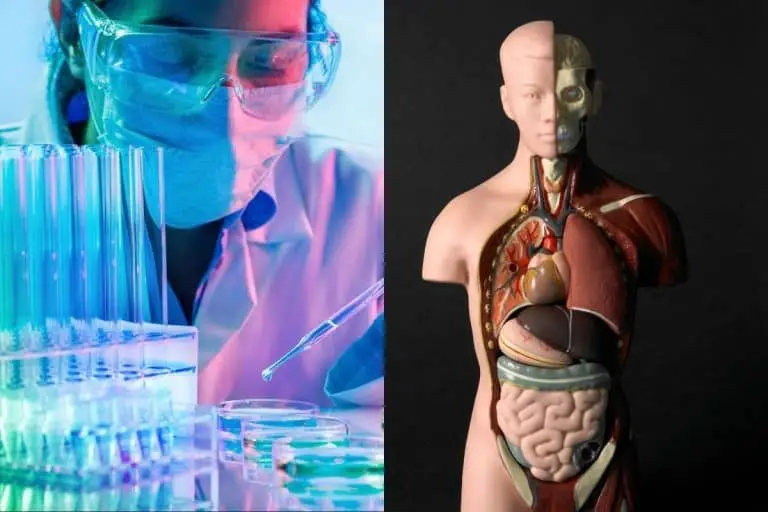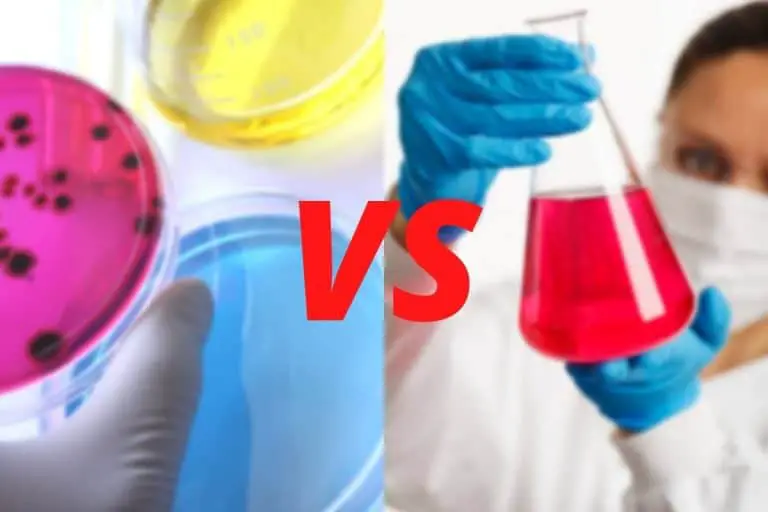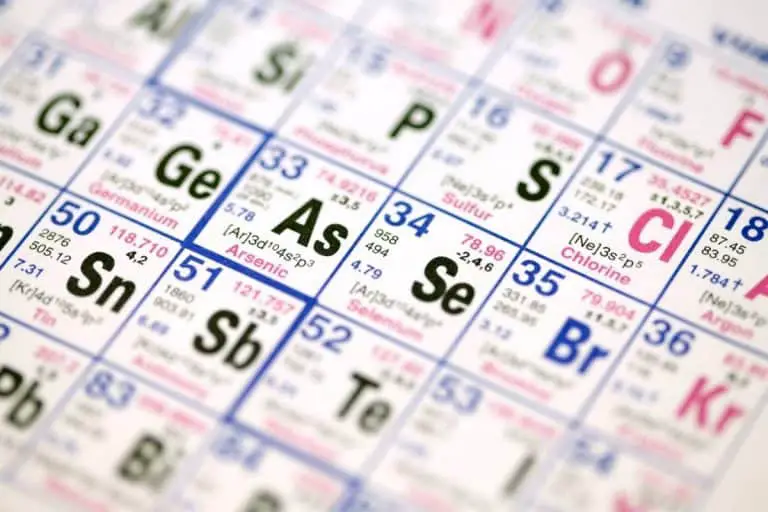Organic vs Inorganic Chemistry: Differences and Difficulty
Chemistry is an age-long field of science that most students come across at some point in their education. Despite its long history, it was only around the 17th century that scientists discovered, or agreed, that chemistry existed in two primary forms: organic and inorganic.
While organic chemistry studies only carbon-containing compounds, inorganic chemistry explores the study of practically all other compounds (carbon-containing or not). Regarding difficulty, organic chemistry can be a little more complex and cumbersome than inorganic chemistry.
Most people, especially students, want to know which is worth exploring and more challenging: organic or inorganic chemistry? What tells these two fields apart? Here, we will provide answers to these and more.
Differences Between Organic and Inorganic Chemistry
The major difference between organic and inorganic chemistry is the preoccupation of both sub-fields. Organic chemistry deals with carbon and hydrogen compounds, while Inorganic chemistry is preoccupied with other elements on the periodic table (source).
Thus, the factors that differentiate organic from inorganic chemistry are organic and inorganic compounds, which will form the basis of our comparisons.

Here are a few differences:
Reactivity
In terms of reactivity, organic compounds are known to be more reactive and can be highly flammable.
Evidence of this is not far-fetched. Hydrocarbons, which are an example of organic compounds, include petroleum and natural gas, and these are known to have high flammable properties.
On the other hand, inorganic compounds are not flammable or volatile unless specifically synthesized to have those attributes.
Physical Properties
Organic compounds can be solids, gases, or liquids regarding the physical state in which they manifest. Inorganic compounds are, however, generally solids.
Composition
Another point of comparison is the organisms in which they occur. Organic compounds, by nature, are found predominantly in living organisms. Inorganic compounds are predominantly present in non-living ones.
Temperature
We can also compare the level of their boiling and melting points. High melting points characterize organic compounds; conversely, inorganic compounds have relatively low melting and boiling points.
Solubility
Also, organic compounds are generally insoluble in water, while inorganic compounds are very much soluble. This simply means organic compounds do not easily dissolve in solvents, unlike inorganic compounds.
The differences between the compounds mentioned above are the main distinguishing factors between organic and inorganic chemistry, especially systems and methodology. There might be some similarities.
Similarities Between Organic and Inorganic Chemistry
While we seem to have highlighted criteria that distinguish organic and inorganic chemistry, we should note that both areas are not so distinctively different and separate as many people may make them out to be. The fact is that often, these disciplines do overlap in some respects.
Systemic Approach, Methodology, and Applications
For one, the systems and methodologies are primarily the same.
They are both used in the making of many products. For instance, both organic and inorganic compounds are used in making pigments and coatings.
Organic compounds from hydrocarbons can be used as petrochemicals to make coatings and other products such as plastics (source).
On the other hand, there are inorganic compounds that can perform the same functions. For instance, titanium dioxide, an inorganic compound, is used to make paints.
The use of both organic and inorganic compounds, either jointly or separately, is also found in drug production and medicine.
Source: American Chemical Society
Which Is More Difficult? Organic vs Inorganic Chemistry
Having understood both sub-disciplines, people naturally get interested in the question of: “Which is more difficult – organic or inorganic chemistry?”
Both organic and inorganic chemistry carry significant degrees of difficulty. For some people, the question of which is more complex may be based on personal preference and prior knowledge/interests. However, based on experience, we can say that organic chemistry is largely more difficult.
A significant reason for the complexity of organic chemistry is due partly to the large number of compounds; it requires a lot of memorization and rote learning.
There is an almost endless number of organic carbons, and then each has its different rules and properties, thus making grasping a lot more complex. What’s more, a number of these rules are flexible. Even at that, organic chemistry becomes less memorization-intensive and more experimental in advanced studies.
What To Expect in an Organic Chemistry Course
Everything you may see around you contains some chemistry; that is, both living and nonliving matter that you may find around contain some chemicals.
Chemicals are the very foundation of life. However, the chemicals present in each item or matter differ from one another.
A single item will almost always contain a group of chemicals and not a single one. When this happens, we have what is called a chemical compound.
Right at the center of the distinction between organic and inorganic chemistry are carbon compounds. Carbon is one of the most abundant elements, only trailing hydrogen, oxygen, and helium.
It is simply indispensable in everyday living, as without it, life as we know it will not exist. Whether for biological or industrial purposes, we cannot do without carbon.
Carbon dioxide (CO2), a type of carbon compound, is a crucial element in the atmosphere. It is needed for the continued survival of life on the planet.
It also exists in almost all the elementary classes of food, including carbohydrates, protein, minerals, and the food items in which they are found.
Carbon is also vital for industrial purposes. It is an essential tool in the formation of hydrocarbons such as methane gas, crude oil, and other fossil fuels that form the basis of today’s industrial and technological endeavors. Without them, it will be extremely difficult to power anything.
Also, the bonding together of carbon in different ways leads to the production of allotropes of carbon. These allotropes have become essential elements and tools in modern living.
For instance, some of the most popular allotropes include diamond and graphite and many more items used for recreational and industrial ventures.
Potential Career Paths for Organic Chemistry
As you already know, carbon is a vital element in the continuous existence of human and non-human organisms. This importance also spills into organic chemistry as a field of study.
Organic chemistry is quite complex, which is why it is a separate sub-discipline in chemistry.
Like the element carbon, there are several applications for organic chemistry, and these range from industry to agriculture, food science, and medicine.
Here, we examine them briefly:
Medicine
Are you looking to pursue a career as a medical doctor? Then you cannot escape using the knowledge of organic chemistry.
Organic chemistry serves as one of the backbones of medicine as a field. An extraordinary number of drugs would have been impossible without the infusion of carbon compounds applying some knowledge of organic chemistry.
Pharmacy
How will organic chemistry help me become a pharmacist, you may wonder. Well, the interaction of all drugs with the human body depends largely on its chemical components, down to the individual compounds.
Also, drug categories such as painkillers, anesthetics, antibiotics, and antidepressants contain huge amounts of carbon compounds. One key role of these organic compounds is that they form the chemical elements that will cause the necessary alterations or desired effects.
In addition, they make the drugs soluble so that they are freely movable within the body upon application.
Industry and Manufacturing
In various manufacturing and industrial endeavors, we cannot do without carbon compounds, and therefore, organic chemistry. A good number of everyday products contain carbon compounds, and these items range from polymers such as nylons and plastics.
Petrochemicals, which are products derived from oil refining, are also a subject of organic chemistry. The process of fractional distillation leads to the separation of materials into organic compounds. From here, we then get detergents, food additives, dyes, and fuels, including gasoline and natural gas.
Furthermore, it is no gainsaying that we would not have the cosmetics industry as we do today if not for organic chemistry study. An overwhelming amount of nail polishes, perfumes, shampoo, and perfume that we cannot do without consists of carbon compounds.
Then, organic chemists are always involved in studying skin problems. They also explore how these relate to the environment to formulate chemical compounds applied in products to solve the issues identified.
Food Science
If desired, you could chase a career in food production. Another important sphere to which organic chemistry is vital is in food science, as it cuts across many areas from the process of producing the food and the aftermath.
For instance, organic compounds are one of the most common elements used in making preservatives needed to elongate the shelf life of food items. Organic preservatives are known to be relatively safer than inorganic ones, hence their popularity.
Today, having a pleasing outward appearance for food is essential, which calls for the use of different additives. One of such additives is coloring agents. Those made of organic compounds are known to be also comparatively less toxic.
Closely related to coloring additives are agents that enhance the flavors of food in a bid to improve taste and consumption. Other applications of organic chemistry in the final delivery of food include food emulsifiers.
Source: Nature Inc
Even before food is finally produced, organic compounds are heavily used to protect and enhance them in the field. These include everything from fertilizers to crop protection chemicals.
What To Expect in an Inorganic Chemistry Course
The other side to organic compounds is inorganic compounds. They consist of items that do not contain carbon-hydrogen bonds. In essence, they lack carbon-carbon and carbon-hydrogen covalent bonds.
The world has an abundance of these inorganic compounds. Apart from carbon and hydrogen, almost all other elements on the periodic table are inorganic and combine to form inorganic compounds.
Despite their broadness, we can categorize inorganic compounds into four main categories:
- Acids
- Bases
- Salts
- Water
Most of the elements regarded as inorganic include carbon dioxide, carbon monoxide, carbonates, cyanates, cyanides, carbides, etc. Most of the compounds bond together through ionic bonding, also known as electrovalent bonding.
The study of inorganic compounds is inorganic chemistry. It manifests in a wide array of forms as it studies the compounds’ behavior, properties, and chemical and physical attributes.
There is descriptive inorganic chemistry which is concerned with classifying and grouping the various compounds.
Theoretical inorganic chemistry deals with quantitative and qualitative theories, which are incredibly critical in developing the field. Synthetic inorganic chemistry covers synthetic and unnatural species of inorganic compounds.
Potential Career Paths for Inorganic Chemistry
Due to its vastness, inorganic chemistry has vast applications in various areas. However, it’s mainly in such sectors as industry and manufacturing, and medical sciences, in a way quite similar to organic chemistry.
Here, we take a look at its applications in these areas:
Manufacturing and Industrial Production
The making of a vast number of manufactured products is only made possible by using inorganic compounds.
Knowledge of inorganic chemistry is needed to ensure that these compounds are applied in the most optimal way possible. Such products include fibers such as textiles, polymer, paper, polyethylene, and particular types of plastics.
The same goes for coatings, pigments, and paints that contain salts or metallic oxides.
Inorganic chemistry can also be applied in mining.
Microchips, Electronics and Computer Technology
We are in the computer age, where increasingly, industries have to rely on computer technology. One of the essential elements in the computer is the microchip, without which various types of computers and most other electronics cannot be manufactured.
However, these chips are primarily made of inorganic elements and compounds, the most popular being silicon.
Inorganic chemists are always demanded to carry out the process of getting these trace elements infused into the tiny surfaces of semiconductor chips.
Furthermore, these chemists are constantly researching improved elements and compounds that may create better chips. For instance, gallium nitride was discovered as a better component of microchips while carrying out such work.
Final Thoughts
Chemistry is quite an exciting field, and the division between organic and inorganic chemistry makes the study even more enjoyable. As we have seen, both have strong relevance and results. The work is for specialists to understand both more deeply and look for ways to integrate them more to create helpful products.







